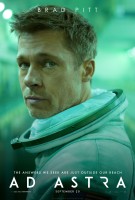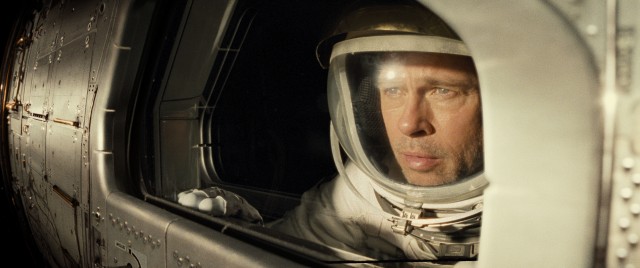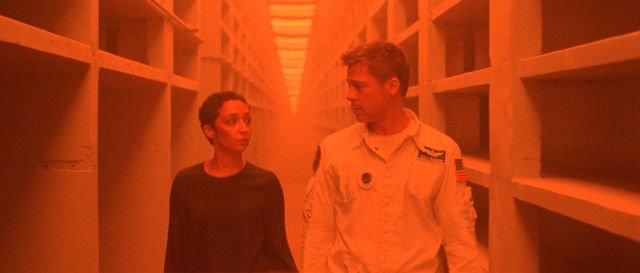Ad Astra Movie Review
 |
Ad Astra
Theatrical Release: September 20, 2019 / Running Time: 123 Minutes / Rating: PG-13 Director: James Gray / Writers: James Gray, Ethan Gross Cast: Brad Pitt (Roy McBride), Tommy Lee Jones (H. Clifford McBride), Ruth Negga (Helen Lantos), John Ortiz (Lieutenant General Rivas), Liv Tyler (Eve), Donald Sutherland (Thomas Pruitt), Greg Bryk (Chip Garnes), Loren Dean (Donald Stanford), Kimberly Elise (Lorraine Devers), John Finn (Brigadier General Stroud), Lisagay Hamilton (Adjutant General Vogel), Donnie Keshawarz (Captain Lawrence Tanner), Bobby Nish (Franklin Yoshida), Sean Blakemore (Willie Levant) |
The fastest way to describe Ad Astra is "Apocalypse Now in space." Writer-director James Gray's original science fiction odyssey did not have quite the storied production troubles of Francis Ford Coppola's landmark Vietnam War drama, but it did miss its original scheduled release twice by a total of eight months.
To certain parts of the online film community, Ad Astra became this curiosity, as its release date approached with nary a trailer in sight. With plot specifics kept vague, much of the excitement seemed to stem from the personnel. The film is produced by and stars Brad Pitt, The more important thing is that there is much to admire about Ad Astra, which boasts the production values and grandeur of a blockbuster, but has inventive ideas and emotional weight more associated with arthouse fare. Perhaps the box office numbers will clarify whether this is more akin to First Man and Moon, although the theater count suggests that Fox and Disney are hoping for this to play more like The Martian and Interstellar.
Pitt plays Roy McBride, a major whose father Clifford (Tommy Lee Jones) is a legend in the astronaut community, albeit a legend long presumed dead from his work on the Lima Project. Roy gets called in, though, and it is revealed that Clifford is believed to be alive in orbit around Neptune and the source of cosmic rays that have created dangerous surges within the solar system. Roy is to take a commercial flight to Mars, where he is to record a video message that can be sent to Neptune and received by Clifford if he is truly alive. Roy has doubts that he is, but as the mission progresses, it becomes clearer to us that Jones has not been cast merely for old photos; Clifford not only seems to be alive but in a mental state comparable to Marlon Brando's Colonel Kurtz in Apocalypse Now. Roy has not been given the order to "terminate with extreme prejudice", but we fear that could be where things are headed.
But the destination being developed is not the only interest of Gray and his co-writer Ethan Gross (TV's "Fringe") here. The journey is full of peril -- from space pirates to an even deadlier and rather unexpected threat. Voiceover narration and mandatory regular psychological evaluations give us insight into Roy's state of mind as he journeys deeper into space than anyone in our world has. He is obviously the Willard of this adventure, only his mission is less concrete and evolving. When authorities try keeping him in the dark and assign him to an amusing "calming room", he plots to do what has to be done.
The inevitable final act of Ad Astra is where the film comes together and you become certain it has hit its marks. Where most $100 million movies arrive at some kind of an action climax, this one treats us to something more arresting and meaningful. And while you might bristle at the loose ends that have been left (characters played by Donald Sutherland and Ruth Negga just kind of disappear), you cannot complain about the follow-through of the principal narrative.
Pitt remains one of the most reliable leading men in the business and this film only strengthens his case for finally winning his first acting Oscar, presumably if he's treated as a Supporting Actor in Quentin Tarantino's Once Upon a Time...in Hollywood. It's tough to speculate on how this will fare during awards season without yet seeing how the moviegoing public receives it. But Gray's film unquestionably strikes me as one of 2019's best so far, albeit with the good movie season still in its infancy. I hope the public shares my enthusiasm for this, not merely to reward the filmmakers for a job well done but to remind Disney of the value of cinema that isn't designed to spark sequels and sell toys. Unfortunately, I have doubts that such a lesson is heeded by the company with five of the year's six top-grossing films which has already vowed to scale back 20th Century Fox's output to five or six movies a year.
Even if you don't care about the significance of a well-made original standalone film succeeding at the box office, you still ought to see Ad Astra on the biggest screen you can, for it is a technical marvel you will most appreciate there.
|
Related Reviews:
DVDizzy.com | DVD and Blu-ray Reviews | New and Upcoming DVD & Blu-ray Schedule | Upcoming Cover Art | Search This Site
DVDizzy.com Top Stories:
Now in Theaters: Joker • Gemini Man • Zombieland: Double Tap • Judy • Maleficent: Mistress of Evil
Brad Pitt: The Tree of Life • World War Z • Moneyball • Once Upon a Time...in Hollywood | Tommy Lee Jones: Men in Black
Directed by James Gray: The Immigrant
Apocalypse Now • Gravity • First Man • Interstellar • The Martian
Text copyright 2019 DVDizzy.com. Images copyright 2019 20th Century Fox, New Regency, Plan B Entertainment, Keep Your Head Productions, RT Features, Madriver Productions, and Disney.
Unauthorized reproduction prohibited.

